Albert Einstein: the man who predicted gravitational waves
- Published
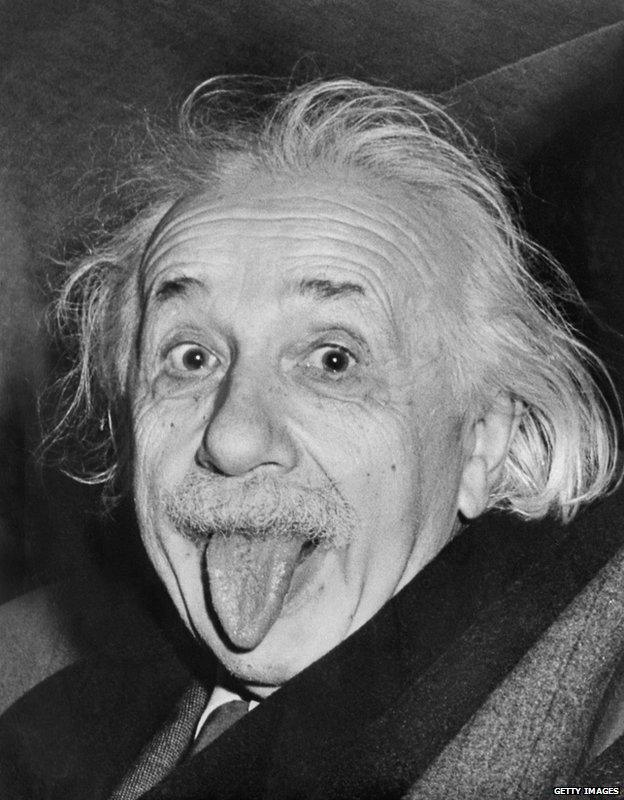
The detection of gravitational waves, announced on Thursday, proves an Albert Einstein theory right. He made huge strides forward in physics, to the point that his surname is used as another way of calling someone a genius. Yet there is plenty more to know about the man himself.
He played the violin
He started learning when he was a young boy and continued playing until old age stopped his left hand from being able to move as quickly and precisely as was needed.
He performed at benefit concerts and used music as a relaxation tool all his life. He was a particular fan of the works of Mozart and Bach.
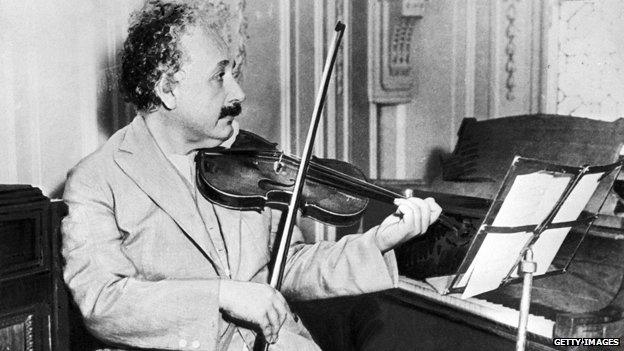
His teacher said he would never amount to anything
Einstein and his family told the press that he was comparatively slow to learn to walk and talk. His sister Maja, writing about her famous brother, said that when Albert was a little boy at home in Germany, people around him worried that he would never speak.
At school, he did not enjoy studying humanities subjects. He struggled with writing and it is widely supposed that he had dyslexia, in a time before it was routinely tested for. According to his sister, his Greek teacher once told him off for the quality of work he had submitted by saying nothing would ever become of him.
He failed his university entrance exam but it was in a job as a clerk that he found time to develop his ideas. He published scientific papers, moved into an academic career, made ground-breaking strides in physics including developing the theory of general relativity, and was given the Nobel Prize in 1921.
His brain was physically unusual
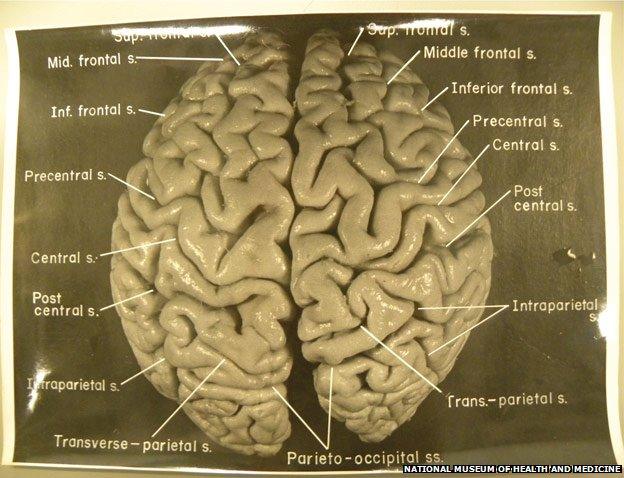
After Einstein died, his brain was measured and weighed by scientists. Cubes of it were sent around the world in the post.
The strange afterlife of Einstein's brain
His brain was found to have more tightly-packed neurons than usual, which might have allowed him to process information more quickly than other people. The part of his brain responsible for spatial cognition and mathematical thought was wider than normal.
But some people say this is all speculation - and it would be hard to prove any link between his physical brain and his genius. Brain size varies from person to person.
A pathologist called Dr Thomas Harvey kept the brain for four decades. In one BBC documentary in 1994, he was seen cutting a piece of the brain off to give it to a visitor.
Most of the remains of the brain are now in New Jersey.
"Relics: Einstein's Brain", directed by Kevin Hull, appeared in the BBC's Arena strand in 1994
He was a refugee
By the time the Nazis came to power, Einstein was already famous. His Jewish ethnicity was widely known and it became more and more difficult for him to work in the face of anti-Semitism in Europe.
In the early 1930s, Einstein took a job in the USA. Shortly afterwards, the Third Reich accused him of treason, and his books were thrown on the fire at a ceremonial book-burning by Nazi students.
Einstein helped other Jews escape, external from Germany but had mixed feelings about having left.
He wrote in a letter: "I am almost ashamed to be living in such peace while all the rest struggle and suffer."
He turned down the chance to be the second president of Israel
In 1952, the Israeli ambassador to the US wrote to Einstein on the prime minister's behalf, asking whether he would take the role of president as a mark of "the deepest respect which the Jewish people can repose in any of its sons".
The letter assured him that he would be given "complete facility and freedom to pursue [his] great scientific work".
All the same, he turned the offer down, external.
He replied that he was "deeply moved" but was not suited to it due to old age and his personality.
He wrote: "All my life I have dealt with objective matters, hence I lack both the natural aptitude and the experience to deal properly with people and to exercise official functions."
"I am the more distressed over these circumstances because my relationship to the Jewish people has become my strongest human bond, ever since I became fully aware of our precarious situation among the nations of the world."
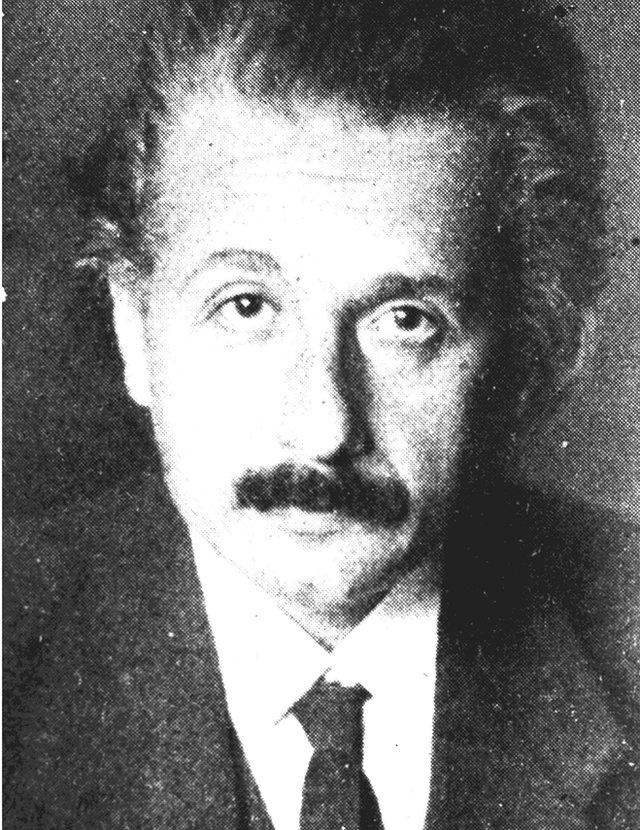
Albert Einstein pictured in 1920
What he did and did not say
There is a truism that if you can't explain something simply, you haven't understood it well enough. The line is often attributed to Einstein, but there is no historical evidence to prove that he said or wrote it, and versions of the same idea had been written down centuries before.
In fact, most of the science Einstein worked on was extremely complicated.
But the idea is a good one. If you are still struggling to wrap your head around gravitational waves, watch the simply-explained videos in this BBC coverage - and then see if you can explain the waves to a friend.
As in the case of author Oscar Wilde - who has been wrongly credited with "Youth is wasted on the young", "Be yourself; everyone else is already taken" and other nuggets - Einstein's name attracts misattributed quotations.
But the scientist did say: "Imagination is more important than knowledge. For knowledge is limited, whereas imagination embraces the entire world, stimulating progress, giving birth to evolution."
That was printed in a newspaper interview with him in 1929.
In the 1950s, a few years before his death, Einstein complained that people were quoting him too much.
He said: "In the past it never occurred to me that every casual remark of mine would be snatched up and recorded. Otherwise I would have crept further into my shell."
The most famous photo of him was taken when he got tired of smiling
Being famous in his own lifetime was sometimes wearying to Einstein.
On his 71st birthday, he got so sick of posing for photographers that he stuck his tongue out.
This became an iconic photograph, and Einstein himself ordered prints of it, external to send to his friends.
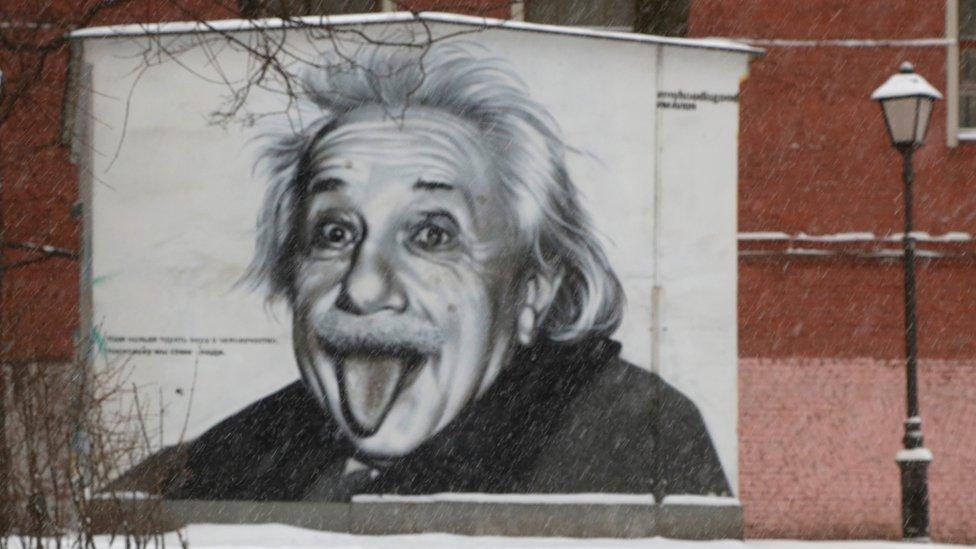
Albert Einstein's famous tongue photo, a cornerstone of popular culture, has been painted on a wall in St Petersburg